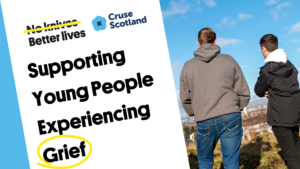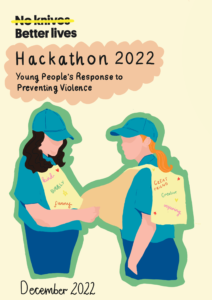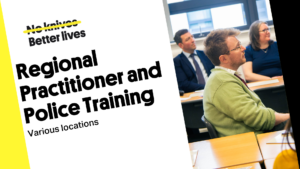The Research Perspective

13 Sep 2018
by Dr Rebecca Foster
There is no denying that knife carrying and knife crime is an issue that we face here in Scotland, the UK and elsewhere in the world. How do we try to address it?
In 2013, Scottish Government commissioned the Scottish Centre for Crime and Justice Research to conduct an extensive literature review, which I was responsible for conducting. This involved bringing together all information about a wide range of approaches and interventions used throughout the world.
What were the findings?
Research shows that we need to understand why young people would choose to carry a knife in the first place. There are many reasons for this, but these can be grouped into two main categories: fear of victimisation and the associated belief that carrying a knife offers protection against this victimisation; and the view that carrying a knife increases one’s social status.
We need to use approaches that respond to these reasons. Research shows that the best way to address these causes is through education.
Education should aim to raise awareness about the dangers and consequences of choosing to carry a knife, and getting involved with knife crime. It should be delivered in both schools and in the communities, recognising that not all young people have a positive relationship with formal education. Educational interventions should be delivered by individuals who are knowledgeable in the area, preferably where this knowledge is a result of direct experience with knife crime, in whichever capacity. These individuals should be adept at engaging young people in this issue.
It is crucial that the genuine fear felt by a number of young people, is not played down; it should be openly acknowledged. Furthermore, young people should be reassured that agencies, such as the police, are working hard to protect them. However, in order to make sure young people fully believe this message and act accordingly (i.e. do not pick up a knife to ‘protect’ themselves), it is essential that young people trust these agencies, such as the police, and have a positive relationship with them. How do we achieve this?
Clearly, criminal justice measures such as stop and search, knife amnesties and heavy custodial sentences have a role to play. These may have some deterrent effect, and may convey to those young people who carry a knife for status reasons that any perceived benefits of carrying a knife, simply are not worth it. However, it is very important that these are not over used. For example, research suggests that the over-use of stop and search worsens or creates tension and feelings of mistrust, between young people and the police. Instead, these measures should supplement, and complement, educational interventions.
Knife carrying and knife crime is a complex problem with no ‘quick fix’. However, the findings from this research reinforce the wisdom of NKBL’s approach, which of course stresses the importance of education and prevention. With the great, and evidence informed , work of NKBL, we are getting there.
Contact details: R.Foster.2@napier.ac.uk




